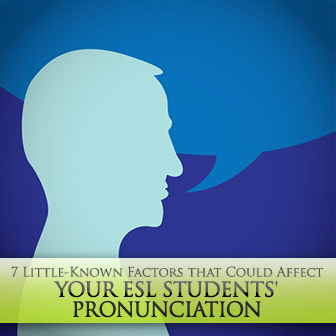Proper pronunciation is vital to your ESL students’ success.
Pronunciation plays a very important role in communication – for your students to communicate effectively, they must speak clearly and make themselves understood. Sometimes simply using the right vocabulary and structures is not enough. Now, why is it that some students do better at acquiring the proper pronunciation than others? Here are the factors that could possibly answer this question.

7 Factors that May Affect Your Students’ Pronunciation:
-
1
Students’ Ages
As an ESL teacher you’ve probably already noticed the difference between teaching young learners and adults. The younger your students are, the easier it is for them to acquire an accurate pronunciation – and it becomes increasingly difficult as they age as the brain’s original plasticity diminishes, and it becomes more rigid.
Now that said, this does not mean adult students should give up trying to improve their pronunciation. It just means they have to work harder. If you teach adult ESL learners, be ready to plan and devote some of your class time to targeted pronunciation practice.
-
2
Learners’ Attitudes
Research and studies consistently show that ESL students with a positive attitude towards learning English learn faster. By the same token, students who are genuinely open-minded and interested in improving their pronunciation often do improve it. It is truly amazing what the right attitude can do.
On the other hand, students who have prejudices or a natural dislike for English will be less successful than those with a positive attitude and open mind. If you have students who are openly negative or complain about the English language, try to have a nice long chat to address these issues. Before you can help students overcome their pronunciation barriers, you’ll need to help them overcome these others barriers first.
-
3
Student Motivation
Out of these first three internal factors, motivation is the one that can really make a difference. Highly motivated students will in all likelihood have a better pronunciation. What motivates students to speak better? Most simply want to fit in; they don’t want to be discriminated against because they have a “funny” accent. Others, like adult learners, really need to speak clearly and effectively for professional business communication.
If you have students who seem to lack motivation, use their passions to help them find it.
-
4
Native Language Interference
Students from different nationalities have varying degrees of difficulty learning proper pronunciation. The difficulty depends on how different their native language is from English. For example, English is a stressed language; Spanish is a syllabic language; Chinese is a tonal language. Phonemes are different in each, as well as the way the mouth, teeth and tongue are used. Your students may have difficulty articulating some sounds because they simply do not exist in their native language, sounds like the “th”.
First, you’ll need to assess your students’ difficulties and formulate a plan to overcome them. Identify the pronunciation problems. Is it a problem with stress? Some phonemes more than others? With Japanese students you may have to practice the “l” and the “r”. Whatever their difficulties are be sure to tailor your pronunciation exercises to help your students overcome them.
-
5
Exposure to English
It will come as no surprise that ESL students who live in English-speaking environment acquire better pronunciation faster because they are immersed in the language. But not all ESL students are immersed in an English-speaking environment. The degree to which they are exposed to English on a daily basis will determine how fast they’ll be able to improve their pronunciation. So, children who go to bilingual, English-speaking schools should have a better pronunciation than those who study English only a couple of times a week.
If you have students who don’t have enough exposure to the English language, encourage them to increase it, either by listening to authentic audio or hanging out with English-speaking locals.
-
6
Not Explicitly Taught
One of the factors that may be affecting your students’ ability to acquire proper pronunciation is quite simply that it is not being explicitly taught in the classroom. This is one of the things that ESL classes often lack and one of the things that makes a world of difference in the acquisition of pronunciation.
Do you correct their pronunciation mistakes as they speak, or do you give them specific pronunciation exercises that target certain phonemes, word pairs or verb endings? Be sure to devote some class time specifically to pronunciation practice.
-
7
Native vs. Non-Native Input
Students’ pronunciation largely depends on the pronunciation they hear on a daily basis. If they are immersed in a community where most of the individuals speak English with a non-native accent, this will surely influence their own pronunciation. Moreover, if the teacher has a non-native accent, it will affect students’ pronunciation as well.
Of course, you can teach English if your accent is not native perfect. But it is your responsibility to strive to improve your pronunciation as much as you can. It is also vital for you to encourage students to seek out native input, either by joining activities or groups with English speakers or spending some time in an English-speaking country.
Students must be proactive in their hopes to secure the right English pronunciation, but teachers are the coaches in this endeavor.
These are the two sides of the pronunciation coin – partners working together to achieve a common goal. One can’t achieve it without the other.
How do these factors affect your students’ ability to learn accurate pronunciation? I’d love to read your thoughts below!
P.S. If you enjoyed this article, please help spread it by clicking one of those sharing buttons below. And if you are interested in more, you should follow our Facebook page where we share more about creative, non-boring ways to teach English.







